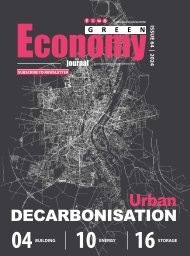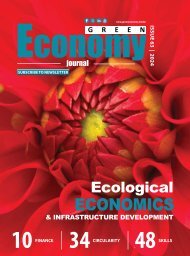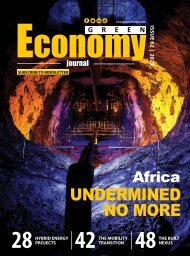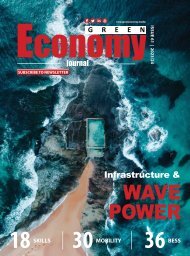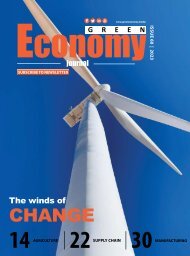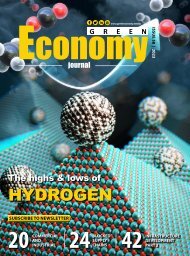Green Economy Journal Issue 48
You also want an ePaper? Increase the reach of your titles
YUMPU automatically turns print PDFs into web optimized ePapers that Google loves.
The path to BEING BETTER<br />
SMART MINING<br />
STEWARDS OF THE EARTH<br />
European countries are working towards sourcing their<br />
future minerals supply in a more responsible way, but the<br />
challenge is to ensure that vulnerable stakeholders along<br />
the value chain are not left out of the conversation.<br />
BY SRK CONSULTING<br />
The RE-SOURCING Project aims to promote responsible sourcing<br />
through creating roadmaps for the renewable energy, mobility<br />
and electronics sectors in the EU. Funded by the European<br />
Commission under the Horizon 2020 project, RE-SOURCING is pursuing<br />
its goal by building a responsible sourcing community among a range<br />
of global stakeholders.<br />
“On the strength of our historical involvement in the mining sector, SRK<br />
Consulting has been drawn into the RE-SOURCING process, where our role<br />
includes facilitating the engagement of stakeholders in Africa and Asia,”<br />
says Andrew van Zyl, partner and principal consultant at SRK Consulting.<br />
These zones, along with South America, are key mineral-supply regions<br />
whose input to the consultation process is vital, adds Van Zyl, noting<br />
that the areas have wrestled with a range of ESG issues that relate to<br />
responsible mineral sourcing, such as artisanal mining and community<br />
engagement. “A significant amount of mining best practice is in fact<br />
emerging from developing countries that host mining sectors, which is<br />
what we are looking to feed into the RE-SOURCING process,” he explains.<br />
Key among the concerns of the responsible sourcing agenda is<br />
environmental degradation, carbon emissions and climate change. The<br />
recent United Nations IPCC report on climate change – which confirms<br />
the severity of global environmental impacts – certainly raises the<br />
urgency around the achievement of concerted world-wide action to<br />
reduce global warming.<br />
With most of the mining – that is, upstream activities in the mineral<br />
value chain – conducted in emerging economies, and a significant portion<br />
of downstream beneficiation and manufacturing occurring in wellestablished<br />
economies, the stakeholders on different sides of this divide<br />
can often have differing interpretations of “responsibility” in the sourcing<br />
process. According to SRK principal consultant ESG Lisl Pullinger, this<br />
means that charting an optimal path to the future requires the voices not<br />
just of the primary mineral consumers but among the producing regions.<br />
“A representative spread of stakeholder voices will help ensure future<br />
policies do not unintentionally remove value along the value chain of<br />
mineral production,” says Pullinger, “Especially where livelihoods may be<br />
more vulnerable to changes introduced by new standards or hurdles to<br />
market participation.”<br />
Mindful of the complexity of finding common ground for progress,<br />
RE-SOURCING is a multi-year process that works towards harmonising of<br />
concepts in search of a global definition of responsible sourcing. This will<br />
involve joint learning from innovative business cases around the world.<br />
Bjanka Korb, senior engineer at SRK Consulting, highlights that hearing<br />
different perspectives was an essential aspect of the current process – so<br />
that all the implications of future responsible sourcing frameworks are well<br />
considered before decisions are made and plans rolled out.<br />
“There is undoubtedly a resounding call for action on global threats<br />
like climate change and any proposed actions need careful thought in<br />
Above, Lisl Pullinger.<br />
Left, Andrew van<br />
Zyl and Bjanka Korb<br />
from SRK Consulting.<br />
terms of their impact on vulnerable groups,” said Korb. The danger that the<br />
RE-SOURCING process is working to avoid, is the development of a path<br />
towards a green economy at the cost of those in the mineral supply chain<br />
who are most vulnerable, says Pullinger.<br />
“The terrain of the responsible sourcing discussion includes a range<br />
of complexities around historical economic development trajectories,<br />
making many stakeholders weary about who will benefit most from the<br />
policy outcomes,” she says. “It is, however, a necessary engagement if we<br />
are to find shared solutions to global challenges like climate change and<br />
economic inequality.”<br />
The current reality of environmental degradation, says Van Zyl, results in<br />
large part from many countries “consuming cheaply” in the past – shifting<br />
the externalised costs onto future generations. “That bill has now come<br />
due, and the cost of the externalities needs to be addressed – which<br />
includes becoming better stewards of our planet going forward,” he adds.<br />
Among the planned events of the RE-SOURCING initiative is a Roadmap<br />
Workshop on the Mobility Sector, to be held virtually in October this year;<br />
Roadmap 2050 focuses on the key value chain steps of the Li-ion battery:<br />
mining, cell production and recycling.<br />
RE-SOURCING Virtual Conference: ON THE ROAD TO RESPONSIBLE<br />
RESOURCING – How to achieve lasting impact<br />
8-10 NOVEMBER 2021<br />
The conference will provide you with the latest on responsible<br />
sourcing through a mix of expert presentations and panel discussions.<br />
REGISTER FOR EVENT HERE<br />
37




